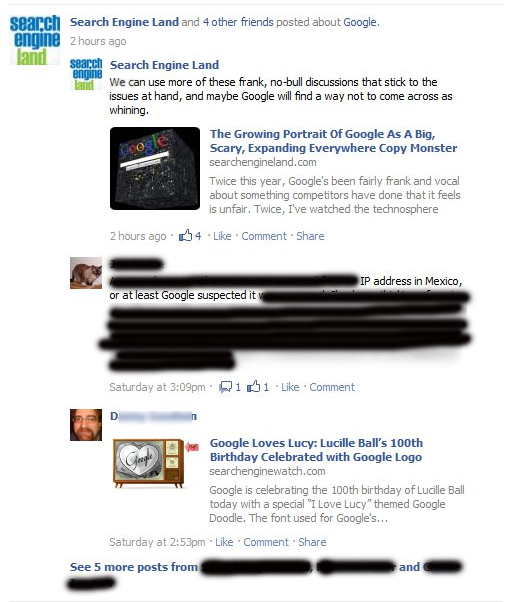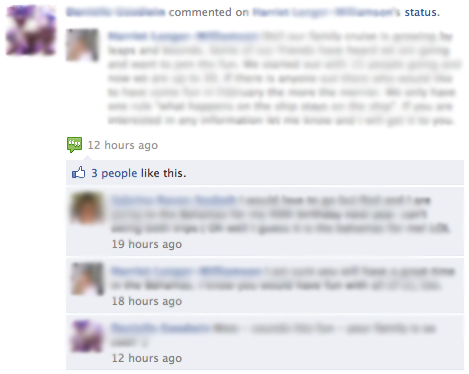Earlier this week Facebook rolled out a clunky “grouping” feature, which lumps together any mention of a topic (say Google, for example). Now Top News is being cluttered with posts from complete strangers. Is this really the best Facebook can offer?
Facebook Groups Stories Together by Topic
“You may notice some of your News Feed stories are now grouped together by topic,” Facebook announced earlier this week. “We want to show you the most relevant and interesting information, and this test is designed to show you trends among what your friends are saying.”
Sounds great in theory. Facebook’s news feed can easily become cluttered, so why not organize it in some meaningful way? Problem: Facebook’s algorithms are still a mess.
What I’ve been getting so far: a group of completely unrelated posts about one large topic (e.g., Google), which links to Google’s Facebook page. And when Facebook gives you the option of seeing more? It’s more unrelated sub-topics.
Let me borrow a screenshot from Thom Craver’s Facebook page to illustrate from earlier this week:

We see another website sharing a link to a blog post, somebody mentioning Google in a status update, me sharing a link, and then five more (unrelated) posts all about Google jumbled together. Oh, and tagging (putting the @ symbol in front of Google) isn’t required to trigger this grouping.
Supposedly, the point of the news feed grouping is to help drive more people to visit a brand’s Facebook page or show what topics are trending – which is important considering only between 3 and 7 percent of fans see your Facebook page posts per day, according to a PageLever study. Such as what is shown in this Harry Potter example Facebook provided:

However, Facebook told Inside Facebook that “its natural language processing doesn’t detect sentiment, how a Page’s name is being used, or whether the mentioned Page was actually the focus of the update. As such, the Posted About stories may highlight Pages that aren’t actually what a user was discussing, or that are being talked about negatively. Brands might be weary of having bitter or defamatory posts linked to their official presence.”
Verdict: At this point, I don’t see how this sorting feature offers any benefit for marketers or users, though ReadWriteWeb is a bit more positive, saying:
“The new link back to pages may also change the dynamic of how users and brands interact with them. Users will see the benefit of pages that a lot of their friends talk about but may not actually “Like.” Expect page Likes to increase as Facebook points users towards them through the news feed. Brands will also be able to take advantage of the new aggregation feature. If brands are active in how they use their pages, there is a good chance they could ensnare a couple of users’ posts within the topic grouping, which should increase Likes, time spent on page and interactivity.”
And sadly, with realtime search engines going the way of the dinosaur, Facebook could be doing something much more useful. Perhaps Facebook’s new engineering hires from the defunct Wowd can help Facebook’s future attempts at filtering.
Oh, and Now There Are Strangers In My News Feed?

As the old saying goes, “a stranger is just a friend I haven’t met yet.” Apparently, Facebook wants us to start friending some strangers.
As we’ve previously reported, Facebook is testing a feature within its News Feed that lets you see what your Facebook friends are commenting on and liking (X commented on Y’s status). The result: more clutter than ever in the Top News feed.
I don’t care if my friend is tagging a photo of someone I’ve never met. I don’t need to see full status updates from people I don’t know or am not connected to just because one of my Facebook friends leaves a comment. I don’t need to know every status update of strangers that my friends hit the like button on.
(Note: this technically isn’t another Facebook privacy issue, as these status updates are coming from public Facebook profiles.)
Additionally, this test is adding in posts about games (if a friend plays Farmville, for example). I don’t have Farmville installed, I’ve never had Farmville installed, so why is Facebook showing me this? I’ve also seen reports that Facebook Group posts are barging their way into others’ news feeds.
Getting into Top News is the goal of every marketer and brand, which is why we’ve previously shared some tips on optimizing for EdgeRank. But this update makes it even harder to cut through all the irrelevant noise and get to the top, or even into, the Facebook Top News feed.


